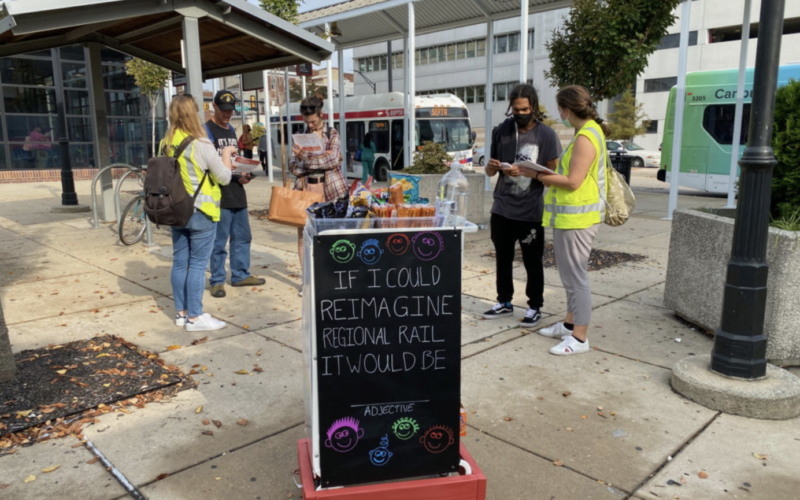
Photo via Wickford Local
Before COVID-19 struck, Boston’s MBTA changed its bus schedules four times a year. But since the pandemic began, the MBTA has accelerated this process, changing schedules four times since March in response to constantly shifting travel patterns. Combined with the agency’s practice of dispatching additional buses in response to real-time conditions, the MBTA has developed a flexible approach to service provision tailored to the challenges posed by COVID-19.
Key to the MBTA’s response is an agile scheduling method the agency initially developed to prepare for the region’s frequent winter snowstorms.
“About two years ago, we realized that we needed a different solution for short-term duration emergencies,” says Kat Benesh, chief of operations strategy, policy and oversight. The MBTA set up a system where operators could pick both their normal schedule and a “snow schedule” that went into effect during emergencies. “When operators went in to pick their work, they could say, ‘I want to go drive the 111,’ but if there’s a major storm and we declare a snow emergency, ‘I will go work this instead,’” says Benesh.
The pandemic marked the first time the MBTA put this scheduling capability into practice. “When COVID hit, we had increasing challenges with work availability,” said Benesh. “But we knew we still needed to provide critical services to those who rely on transit for essential trips. We realized the need to build additional flexibility to our service, but still be very predictable and reliable so those essential workers knew which routes they could count on.” Staff quickly realized that “snow schedules” were the right tool for the moment.
As the agency’s data shows, routes that primarily serve Black, brown, and lower-income neighborhoods have retained a higher share of ridership than the system as a whole. The MBTA currently updates bus schedules nearly once a month in response to these shifting ridership patterns.
With every update, bus operators select their normal schedule and an emergency schedule. When selecting emergency work, operators opt for shifts that are either “scheduled” — where the routes and times are firmly defined — or “flexible.” When a shift is flexible, operators are given a start and end time, but are informed of the routes they’re assigned to upon arrival at work.
“This arrangement gives us some organizational flexibility to say there’s a lot of unknowns in the world right now,” explains Benesh. “Transit demand in Boston has been incredibly durable on some routes, and less so in other places. Having all those flexible resources allows us to decide on a day-to-day basis where to put them.”
Most importantly, this flexibility allows the agency to operate all of its scheduled trips despite lower operator availability. “So if operator A is unavailable, then operator B who was supposed to do a run as directed or is on the cover list can fill in for operator A,” says Benesh.
The T also has greater staffing ability to dispatch additional buses at any given time. “We’re running additional service, based on where we’re seeing crowding and demand,” said Benesh. From a rider’s perspective, that may look like more frequent service, or two buses arriving at once to minimize crowding. “There’s been no one-size-fits-all solution, but rather looking at the entire system and trying to take a system approach and solving each challenge we see with a solution that fits it.”
Flexible scheduling has enabled the agency to deliver a better, more predictable rider experience. But there have been some kinks to iron out between management and the union representing T operators. “There’s definitely been challenges, and it has not been perfect,” Benesh said. “But we appreciate the patience and support we’ve gotten from our operators and union leadership. They’ve been phenomenal partners with us throughout this.”
The T is working closely with its union to monitor the new arrangement, and the quality of the unscheduled work. “It’s essential for something like this to be an iterative process, to know you’re not going to get it perfect the first time, and be very open to feedback,” said Benesh. The fact that the schedules are changing so often, and that nothing is set in stone, has helped to make the new paradigm more palatable to operators.
Looking ahead, Benesh says the MBTA will likely hang on to the concept of flexible schedules, even after COVID-19 becomes a distant memory. “The value of having them and the value of both clarity and certainty with all of our operators about what to do and what your work looks like [in times of disruption] and the reliability of us all knowing what our alternative is has been a really good learning process.”
Benesh attributes the MBTA’s nimble response to the pandemic — from making data-driven service changes to developing real-time crowding information — to having clarity across the organization about the T’s mission. “Our principles have been driving our service – the importance of continuing to provide service to allow for essential trips for essential workers, and ensuring the safety of our customers and our employees. Those strategic principles then drive the decisions we make so that everything is an integrated strategy.”
 New TransitCenter Report: To Solve Workforce Challenges Once and For All, Transit Agencies Must Put People First
New TransitCenter Report: To Solve Workforce Challenges Once and For All, Transit Agencies Must Put People First
TransitCenter’s new report, “People First” examines the current challenges facing public sector human resources that limit hiring and retention, and outlines potential solutions to rethink this critical agency function.
Read More A Transit Revolution in Philadelphia?
A Transit Revolution in Philadelphia?
The Southeastern Pennsylvania Transportation Authority (SEPTA) has been working throughout the pandemic on several system-wide planning initiatives that have the potential to transform transit service in and around the city of Philadelphia.
Read More